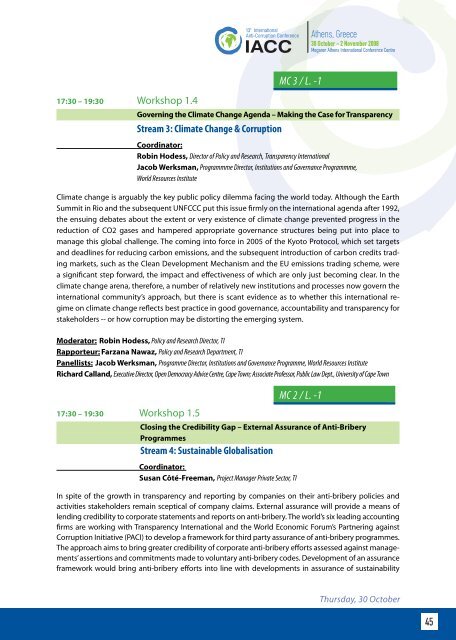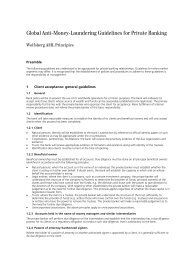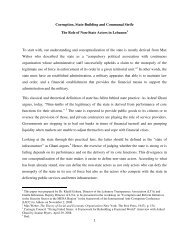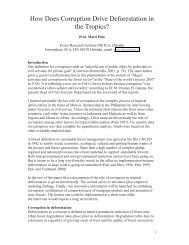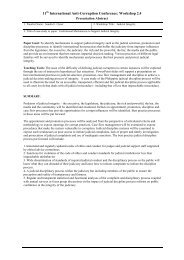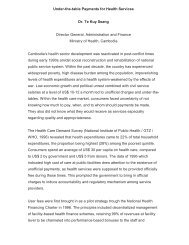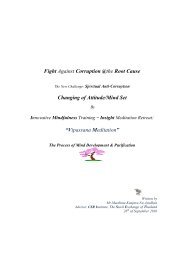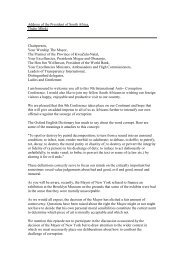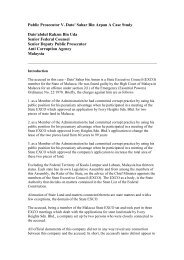Final Programme - 13th International Anti-Corruption Conference
Final Programme - 13th International Anti-Corruption Conference
Final Programme - 13th International Anti-Corruption Conference
You also want an ePaper? Increase the reach of your titles
YUMPU automatically turns print PDFs into web optimized ePapers that Google loves.
Megaron Athens <strong>International</strong> <strong>Conference</strong> CentreMC 3 / L. -117:30 – 19:30 Workshop 1.4Governing the Climate Change Agenda – Making the Case for TransparencyStream 3: Climate Change & <strong>Corruption</strong>Coordinator:Robin Hodess, Director of Policy and Research, Transparency <strong>International</strong>Jacob Werksman, Programmme Director, Institutions and Governance Programmme,World Resources InstituteClimate change is arguably the key public policy dilemma facing the world today. Although the EarthSummit in Rio and the subsequent UNFCCC put this issue firmly on the international agenda after 1992,the ensuing debates about the extent or very existence of climate change prevented progress in thereduction of CO2 gases and hampered appropriate governance structures being put into place tomanage this global challenge. The coming into force in 2005 of the Kyoto Protocol, which set targetsand deadlines for reducing carbon emissions, and the subsequent introduction of carbon credits tradingmarkets, such as the Clean Development Mechanism and the EU emissions trading scheme, werea significant step forward, the impact and effectiveness of which are only just becoming clear. In theclimate change arena, therefore, a number of relatively new institutions and processes now govern theinternational community’s approach, but there is scant evidence as to whether this international regimeon climate change reflects best practice in good governance, accountability and transparency forstakeholders -- or how corruption may be distorting the emerging system.Moderator: Robin Hodess, Policy and Research Director, TIRapporteur: Farzana Nawaz, Policy and Research Department, TIPanellists: Jacob Werksman, <strong>Programme</strong> Director, Institutions and Governance <strong>Programme</strong>, World Resources InstituteRichard Calland, Executive Director, Open Democracy Advice Centre, Cape Town; Associate Professor, Public Law Dept., University of Cape Town17:30 – 19:30 Workshop 1.5MC 2 / L. -1Closing the Credibility Gap – External Assurance of <strong>Anti</strong>-Bribery<strong>Programme</strong>sStream 4: Sustainable GlobalisationCoordinator:Susan Côté-Freeman, Project Manager Private Sector, TIIn spite of the growth in transparency and reporting by companies on their anti-bribery policies andactivities stakeholders remain sceptical of company claims. External assurance will provide a means oflending credibility to corporate statements and reports on anti-bribery. The world’s six leading accountingfirms are working with Transparency <strong>International</strong> and the World Economic Forum’s Partnering against<strong>Corruption</strong> Initiative (PACI) to develop a framework for third party assurance of anti-bribery programmes.The approach aims to bring greater credibility of corporate anti-bribery efforts assessed against managements’assertions and commitments made to voluntary anti-bribery codes. Development of an assuranceframework would bring anti-bribery efforts into line with developments in assurance of sustainabilityThursday, 30 October45


